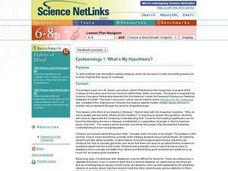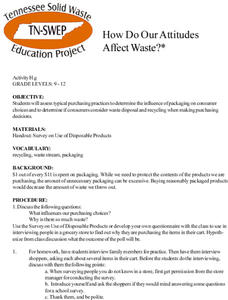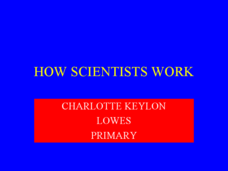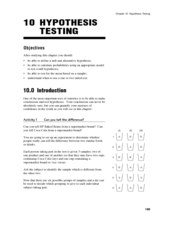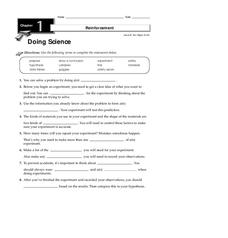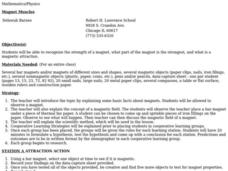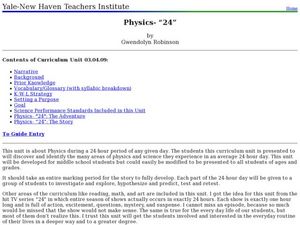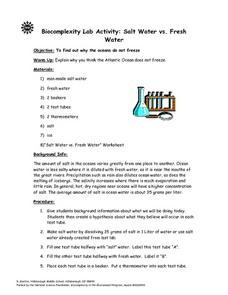Zebrafish in the Classroom
Mini‐Experiment with GloFish: Learning the Scientific Methods
If you need a way to reinforce the scientific method in your elementary classroom, use a science experiment about GloFish. The resource includes several pages of worksheets that guide learners through making a hypothesis, testing their...
Teach Engineering
Flow Rates of Faucets and Rivers
Go with the flow and use a helpful resource. A set of two activities has learners investigate flow rates. They first determine the flow rate of a faucet by measuring how long it takes to fill a bucket. Using the results, they make a...
Curated OER
The Importance of Making Labs a Priority
The benefits of inquiry-based exploration can be attained in any classroom.
Curated OER
Applied Science-Science and Math (2A) Post Lab
Second graders create a graph about TV watching. In this bar graph lesson, 2nd graders make a hypothesis about how much TV 2nd graders watch per week. They record their TV watching for a week and bring it to school to create a class...
Curated OER
Floating Soap
Learners explore the density of soap. In this science instructional activity, students conduct an experiment to find which types of soap will float. Learners make a hypothesis and record their observations.
Curated OER
Epidemiology 1: What's My Hypothesis?
Students demonstrate how descriptive epidemiological clues can be used to make educated guesses as to what might be the cause of a disease.
Howard Hughes Medical Institute
Gorongosa: Scientific Inquiry and Data Analysis
How does the scientific process begin? Introduce ecology scholars to scientific inquiry through an insightful, data-driven lesson. Partners examine data from an ongoing research study to determine the questions it answers. The resource...
Curated OER
How Do Our Attitudes Affect Waste?
High schoolers conduct a survey of society's typical purchasing practices to determine the influence of packaging on consumer choices and to determine if consumers consider waste disposal and recycling when making purchasing decisions.
Curated OER
How Scientists Work
The arsenal of tools a scientist uses to observe the world are varied. This great presentation gives students a look at some of the strategies they should use when looking at the world around them. The information can be used as a...
Curated OER
M&M Probability
Students apply the scientific method in order to determine the probability of specific colors in a bag of M&M's. They determine the definition of probability and how it can be used. They make a hypothesis and conduct an experiment to...
Curated OER
Hypothesis Testing Summary and Exercise Sets
In this thirteen page instructional activity, students solve four sets of exercises concerned with hypothesis testing. A hypothesis testing summary is provided.
Curated OER
Indirect Observation
Students observe obscertainers through indirect observations and make hypotheses about the internal wall structures of the containers. In this indirect observation lesson plan, students make observations of 4 obscertainers with a steel...
Curated OER
The Egg Activity
Students comprehend the three basic steps of science: 1) Observation, 2) Statements of cause and effect (Hypotheses), and 3) Testing. By working with an egg, students are required to observe an object that is very common to them. This...
Curated OER
Types of Marine Debris
Students conduct an experiment. In this marine debris and environment protection lesson, students categorize trash into piles, predict whether these trash items will sink, float or be picked up and carried by the wind and then test...
Curated OER
Doing Science
In this science experiment process worksheet, students will learn about the steps of conducting a science experiment, including creating a hypothesis, collecting data and drawing a conclusion. This worksheet has 8 fill in the blank...
Curated OER
Problem-Solving Methods in Biology
In this problem-solving worksheet, students will read a biologist's observations about elephant communication. Students will write down what the biologist observed, what facts she knew about elephants, and her hypothesis. Students will...
Curated OER
BRIDGING THE GENERATION GAP
High schoolers create a hypothesis about the attitudinal differences between generations, test their hypothesis with a survey, chart their findings, and present their answers to the class.
Curated OER
Lesson 2 Its a Small World (Day 2)
Students are able to explain how the water cycle recycles the earth's water supply. They are able to make use of the knowledge of land forms learned in social studies. Students are able to form a hypothesis on how/why the water cycle...
Curated OER
Scientific Problem Solving
In this problem solving worksheet, students will conduct an experiment to answer this question: "How does watching too much television affect us?" Students will form a hypothesis, collect data, analyze their data, and draw a conclusion....
Curated OER
Magnet Muscles
Students experiment with magnetism. For this science lesson, students are divided into cooperative learning groups and use the scientific method to test their hypothesis. Each group performs a different experiment.
Curated OER
Experimenting with Motion
Students design an experiment to change the motion of a rolling marble. In this designing an experiment lesson plan, students form a research question, they develop a hypothesis and they design an experiment using a graphic organizer to...
Curated OER
Popcorn Science: Pop Goes the Kernel!
Students conduct various experiments to determine why popcorn pops. They design tests to determine the effect of water in the kernels on its popping. Once the experiments are completed, they write summaries of them proving or...
Curated OER
Physics -- 24
Students record all of the instances of physics and science they are involved with in a full day. As a class, they complete a KWL chart on physics and read a story about Murphy's Law and the character's experiences. Individually, they...
Curated OER
Salt Water vs. Fresh Water
Young scholars explore why the oceans do not freeze. They explain why they think the Atlantic Ocean does not freeze. Students are given background information about what they are doing. They create a hypothesis about what they believe...





